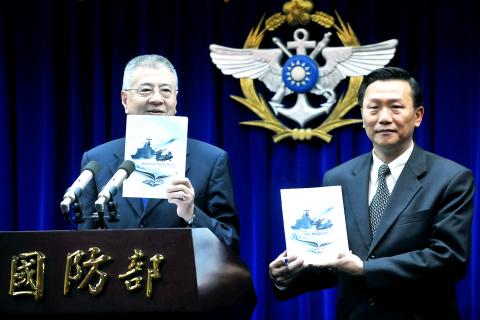The Ministry of National Defense yesterday released its quadrennial defense review (QDR) in which the ministry warned of a rising Chinese military threat, but omitted provocative wording that might anger Beijing.
The long-awaited report was the second published by the ministry, which is required by law to submit a QDR to the legislature within 10 months of every presidential inauguration.
While tensions across the Taiwan Strait have been at their lowest in six decades, China’s military threat remains strong because its strategy is to “rapidly end an island conflict and reduce the possibility of foreign interference.”

Photo: Mandy Cheng, AFP
China now possesses the ability to impose a partial blockade of Taiwan and to conduct “anti-access/area denial” operations in certain areas, the review said.
Minister of National Defense Kao Hua-chu (高華柱) held a briefing on the 70-page report — which was similar to the 2009 edition in its content, despite being dozens of pages shorter — to legislators yesterday morning.
Lawmakers questioned a number of points, including the ministry’s change of stance on proposed military confidence-building measures between Taiwan and China.
Kao said there is a lack of a public consensus on signing a cross-strait peace agreement and confidence-building measures, so a hasty move toward the initiatives would be risky.
The ministry’s position was different in 2009, when it appeared to be more positive about confidence-building measures.
Department of Strategic Planning Director-General Cheng Yun-peng (成雲鵬) said at a press conference yesterday afternoon that military mutual trust would be meaningless without mutual trust on political affairs, while Deputy Minister of National Defense Andrew Yang (楊念祖) said that the confidence-building measures should be seen as building blocks.
The ministry did not explain why the report does not mention asymmetrical warfare capability, a topic which occupied an entire chapter in the 2009 review, in which it was stated that Taiwan would “make decisive attacks” to counter China if necessary.
The report contained four chapters on the security environment and national defense challenges; national defense policy and strategic guidance; joint warfare capabilities and preparedness; as well as defense organization and transformation.
Lawmakers and observers were also concerned about the all-voluntary military service system, which the ministry had pledged to achieve by next year, but which it has now postponed until 2016 due to a lack of resources and a poor recruitment record.
The ministry said the military personnel target would be about 215,000 to avoid personnel shortages, despite recruitment having been hit hard by financial difficulties.
In response to a media report which, quoting Chinese Nationalist Party (KMT) Legislator Lin Yu-fang (林郁方), said the military is considering relaunching a domestic project to manufacture third-generation domestic fighter jets, Kao said Taiwan has been purchasing arms from the US because they cannot be manufactured domestically.
However, he said that Taiwan is trying to make domestic production of unmanned combat air vehicles possible, adding that Washington has yet to respond to requests for assistance in the domestic production of various weapons systems.

SECURITY: As China is ‘reshaping’ Hong Kong’s population, Taiwan must raise the eligibility threshold for applications from Hong Kongers, Chiu Chui-cheng said When Hong Kong and Macau citizens apply for residency in Taiwan, it would be under a new category that includes a “national security observation period,” Mainland Affairs Council (MAC) Minister Chiu Chui-cheng (邱垂正) said yesterday. President William Lai (賴清德) on March 13 announced 17 strategies to counter China’s aggression toward Taiwan, including incorporating national security considerations into the review process for residency applications from Hong Kong and Macau citizens. The situation in Hong Kong is constantly changing, Chiu said to media yesterday on the sidelines of the Taipei Technology Run hosted by the Taipei Neihu Technology Park Development Association. With

CARROT AND STICK: While unrelenting in its military threats, China attracted nearly 40,000 Taiwanese to over 400 business events last year Nearly 40,000 Taiwanese last year joined industry events in China, such as conferences and trade fairs, supported by the Chinese government, a study showed yesterday, as Beijing ramps up a charm offensive toward Taipei alongside military pressure. China has long taken a carrot-and-stick approach to Taiwan, threatening it with the prospect of military action while reaching out to those it believes are amenable to Beijing’s point of view. Taiwanese security officials are wary of what they see as Beijing’s influence campaigns to sway public opinion after Taipei and Beijing gradually resumed travel links halted by the COVID-19 pandemic, but the scale of

A US Marine Corps regiment equipped with Naval Strike Missiles (NSM) is set to participate in the upcoming Balikatan 25 exercise in the Luzon Strait, marking the system’s first-ever deployment in the Philippines. US and Philippine officials have separately confirmed that the Navy Marine Expeditionary Ship Interdiction System (NMESIS) — the mobile launch platform for the Naval Strike Missile — would take part in the joint exercise. The missiles are being deployed to “a strategic first island chain chokepoint” in the waters between Taiwan proper and the Philippines, US-based Naval News reported. “The Luzon Strait and Bashi Channel represent a critical access

Pope Francis is be laid to rest on Saturday after lying in state for three days in St Peter’s Basilica, where the faithful are expected to flock to pay their respects to history’s first Latin American pontiff. The cardinals met yesterday in the Vatican’s synod hall to chart the next steps before a conclave begins to choose Francis’ successor, as condolences poured in from around the world. According to current norms, the conclave must begin between May 5 and 10. The cardinals set the funeral for Saturday at 10am in St Peter’s Square, to be celebrated by the dean of the College